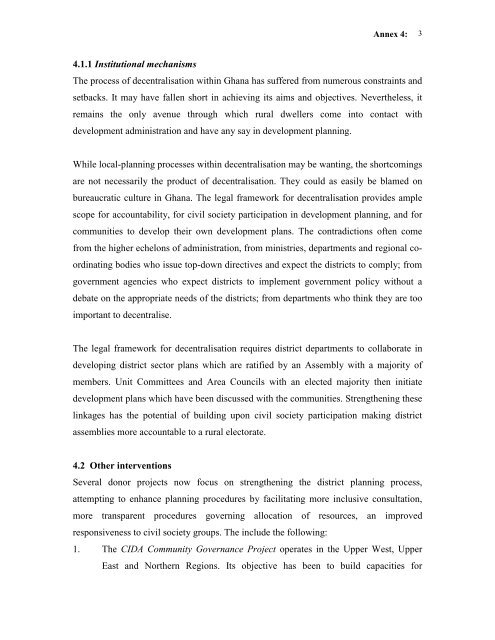Poverty Dimensions of Public Governance and Forest Management ...
Poverty Dimensions of Public Governance and Forest Management ...
Poverty Dimensions of Public Governance and Forest Management ...
Create successful ePaper yourself
Turn your PDF publications into a flip-book with our unique Google optimized e-Paper software.
Annex 4: 3<br />
4.1.1 Institutional mechanisms<br />
The process <strong>of</strong> decentralisation within Ghana has suffered from numerous constraints <strong>and</strong><br />
setbacks. It may have fallen short in achieving its aims <strong>and</strong> objectives. Nevertheless, it<br />
remains the only avenue through which rural dwellers come into contact with<br />
development administration <strong>and</strong> have any say in development planning.<br />
While local-planning processes within decentralisation may be wanting, the shortcomings<br />
are not necessarily the product <strong>of</strong> decentralisation. They could as easily be blamed on<br />
bureaucratic culture in Ghana. The legal framework for decentralisation provides ample<br />
scope for accountability, for civil society participation in development planning, <strong>and</strong> for<br />
communities to develop their own development plans. The contradictions <strong>of</strong>ten come<br />
from the higher echelons <strong>of</strong> administration, from ministries, departments <strong>and</strong> regional coordinating<br />
bodies who issue top-down directives <strong>and</strong> expect the districts to comply; from<br />
government agencies who expect districts to implement government policy without a<br />
debate on the appropriate needs <strong>of</strong> the districts; from departments who think they are too<br />
important to decentralise.<br />
The legal framework for decentralisation requires district departments to collaborate in<br />
developing district sector plans which are ratified by an Assembly with a majority <strong>of</strong><br />
members. Unit Committees <strong>and</strong> Area Councils with an elected majority then initiate<br />
development plans which have been discussed with the communities. Strengthening these<br />
linkages has the potential <strong>of</strong> building upon civil society participation making district<br />
assemblies more accountable to a rural electorate.<br />
4.2 Other interventions<br />
Several donor projects now focus on strengthening the district planning process,<br />
attempting to enhance planning procedures by facilitating more inclusive consultation,<br />
more transparent procedures governing allocation <strong>of</strong> resources, an improved<br />
responsiveness to civil society groups. The include the following:<br />
1. The CIDA Community <strong>Governance</strong> Project operates in the Upper West, Upper<br />
East <strong>and</strong> Northern Regions. Its objective has been to build capacities for
















